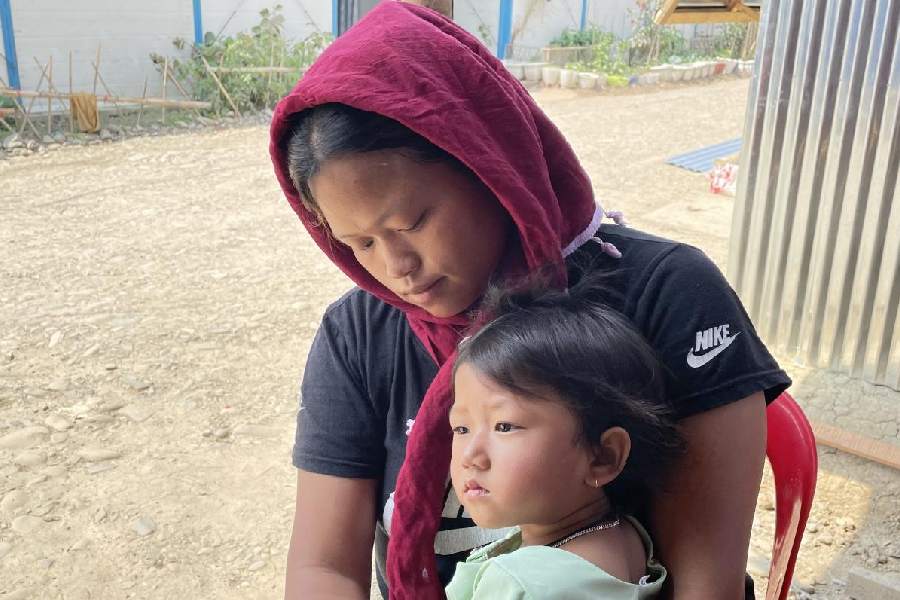Monthly dates in Mizoram or maybe Assam if at all, single parenting and the constant fear of abandonment. For Manipur's Meitei-Kuki couples forced to live apart in ‘community’ enclaves, this is how life has been since ethnic clashes broke out in the state last May.
As crisis continues in the polarised state, where the Meitis are concentrated in Imphal Valley and the Kukis have moved to the hills around, inter-tribe couples are facing the cruel brunt of a conflict that has claimed more than 200 lives and displaced many thousands since May 3, 2023.
If a mother gets to see her children maybe once a month, there is a father who hasn’t seen his daughter since she was born. And then there is the constant fear of family bonds being strained perhaps to breaking point with a wife wondering if her husband will abandon her and a couple contemplating what lies ahead for them as a unit. The future stretches uncertain.
Irene Haokip, for instance, is a Kuki who moved to Imphal after she got married. One year on, the 42-year-old has moved to Churachandpur, a Kuki dominated area, to be with her family while her husband and their children, a five-year-old son and a three-year-old daughter, stay on in Imphal.
"My husband used to work as a construction contractor. I met him when a neighbour's house in Bishnupur was getting constructed. We fell in love and he would come to the area to meet me often. We got married in 2018 and have two children," Haokip told PTI.
Bishnupur is between Meitei dominated Imphal and Kuki dominated Churachandpur. It earlier housed people from both communities and is now considered a buffer zone.
"My husband sent me to my parents' home last year fearing for my safety in the valley when clashes broke out. There has been no going back since. The children are with him because we fear that they might not be safe in Churachandpur since they are Meitei children," Haokip added.
She meets her family once a month in neighbouring Mizoram, travelling 15 hours each way.
"He brings the children there too. Many other couples also do that. We meet once a month and come back to our respective houses. My children miss me but it feels like a choice between being alive and mothers' love." As Manipuris count their losses, many say that this was not always so. Meitei-Kuki marriages were not uncommon and never a source of societal trouble with the two communities mingling easily. It changed on May 3 when trouble broke out after after a 'Tribal Solidarity March' was organised in the hill districts to protest against the Meitei community's demand for Scheduled Tribe (ST) status.
A month later, Laishram Singh, a Kuki, became a father.
He wanted to be the best father when he got to know about his wife's pregnancy in 2022. They were expecting their first child in June and were shopping for clothes and toys.
But destiny had other plans.
Singh moved to the hills where Kukis live and his wife Achanba, a Meitei, stayed back. She had lost her parents five years ago and had to move to a relief camp in Imphal Valley in May last year where she gave birth to a girl in June.
Eleven months later, Singh hasn’t yet met his daughter.
Achanba worries the distance might just end her marriage.
"I have a husband but I am still forced to live life as a single mother... he calls me sometimes and I send him pictures but the communication is gradually dropping. I fear that if this goes on for long, his family might pressure him into marrying a Kuki girl and he will abandon me. This also causes us to fight.” "I am not a widow, I am not a divorcee...I don't know what kind of separation is this," Achanba added helplessly.
Nirmala, a Kuki, who ran a shop in all women market Ima Keithel till last year, now lives in the hills and has no stable means of livelihood. She also fears being abandoned.
Her husband, a Meitei, who lives with their son and his parents in Sugnu area in Meitei dominated Imphal, initially used to send her money but has stopped.
"We have been married for 15 years. My shop was a good contributor to our household income that has stopped now. Here I live with my brother and sister-in-law and take up odd jobs but there is no stable income. I feel like I am a burden on them..if this continues I will have to move to a relief camp," 45-year-old Nirmala told PTI.
Others such as Pema Dimpu and her Kuki husband say they are constantly discussing whether they should move to another state. Dimpu, a Meitei, stays in Imphal Valley while her husband has gone to the hills.
"That seems to be the only way out now that we move somewhere else and start a new life. It has been a year and there is no peace in sight... no idea when we can coexist like before without the threat of life constantly looming over us," Dimpu said.
The hill state has witnessed sporadic, sometime intense, ethnic clashes since May 3 last year between the majority Meitei community and the Kukis.
Except for the headline, this story has not been edited by The Telegraph Online staff and has been published from a syndicated feed.











